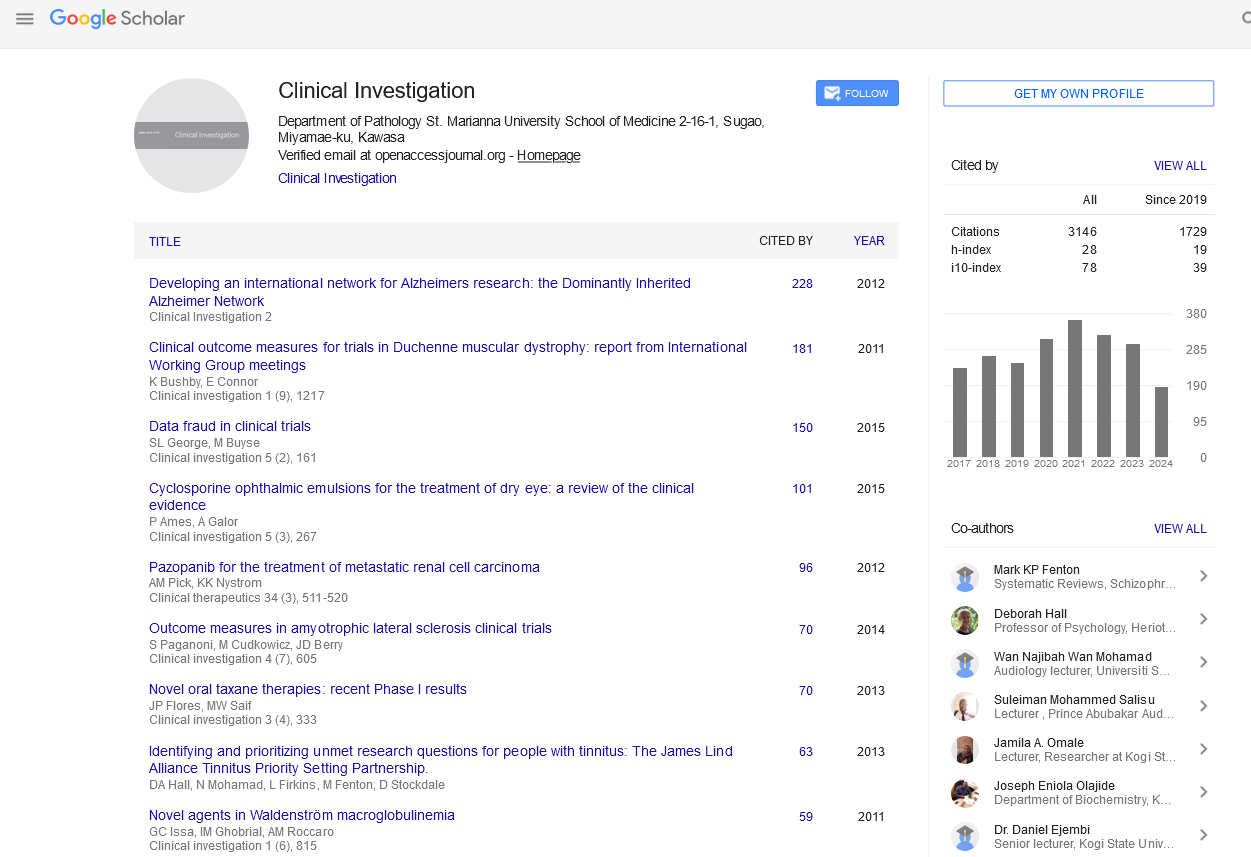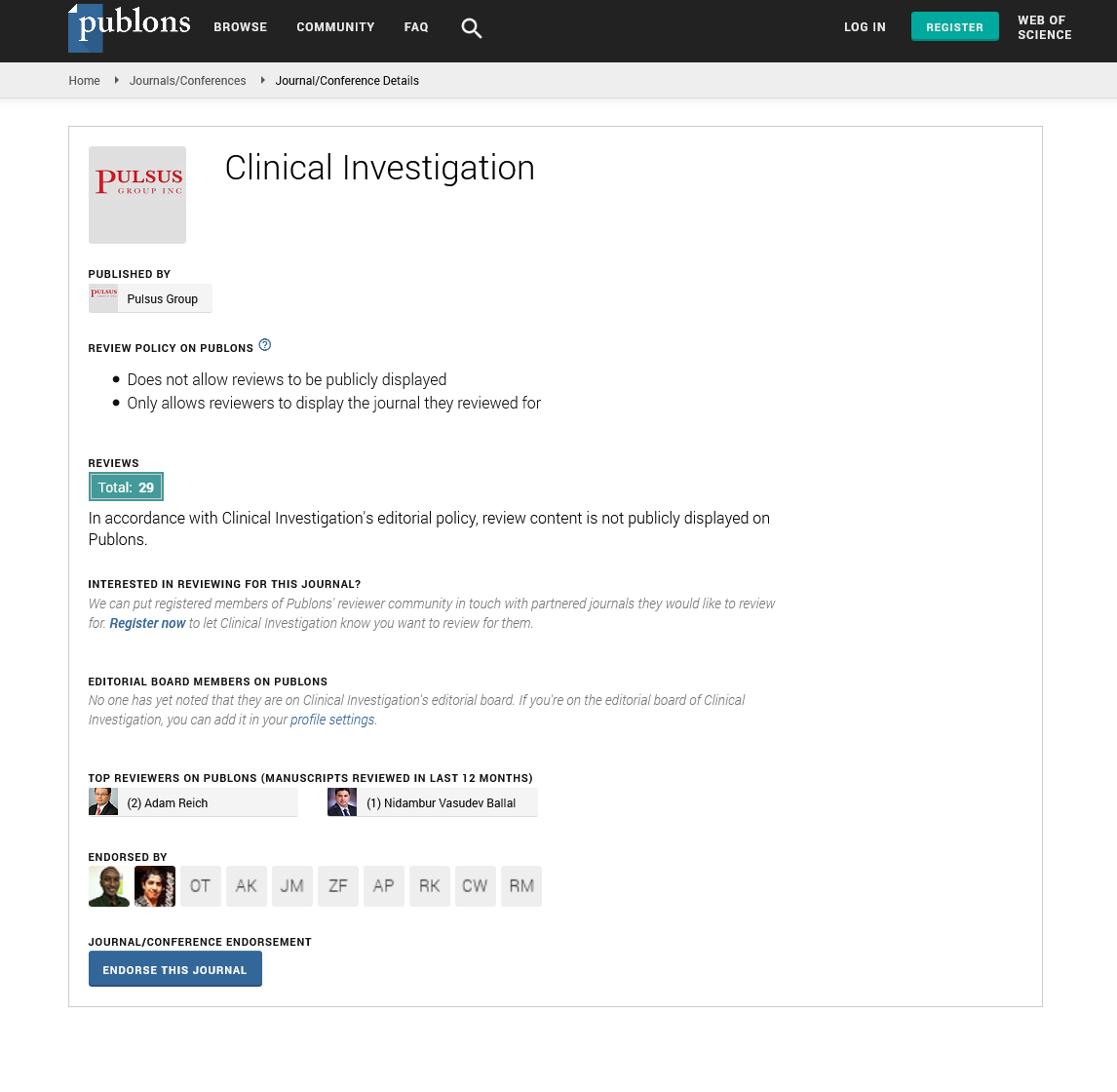Opinion Article - Clinical Investigation (2024) Volume 14, Issue 3
Cancer Research: Advancements, Challenges, and Future Directions
Received: 4-Mar-2024, Manuscript No. fmci-25-160267; Editor assigned: 6-Mar-2024, PreQC No. fmci-25-160267(PQ); Reviewed: 14-Mar-2024, QC No. fmci-25- fmci-25-160267(Q); Revised: 23-Mar2024, Manuscript No. fmci-25- fmci-25-160267(R); Published: 28-Mar-2024
Abstract
Cancer remains one of the leading causes of death globally, and despite significant progress in treatment and early detection, it continues to present a major health challenge. Cancer research has been instrumental in uncovering the underlying mechanisms of the disease and developing new therapeutic strategies. This article explores recent advancements in cancer research, including innovations in early detection, targeted therapies, immunotherapy, and precision medicine. It also discusses the challenges faced by researchers, such as the complexity of cancer biology, treatment resistance, and disparities in healthcare access. The article concludes by looking forward to the future of cancer research, emphasizing the importance of continued innovation, collaboration, and patient-centered approaches in improving outcomes for cancer patients.
Keywords
Cancer research • Targeted therapies • Immunotherapy • Precision medicine • Early detection • Cancer biology • Treatment resistance
Introduction
Cancer is a complex and diverse group of diseases characterized by the uncontrolled growth of abnormal cells. It affects nearly every organ in the human body and remains one of the most significant public health challenges worldwide. Despite significant progress in understanding cancer biology and improving treatment options, cancer continues to be the second leading cause of death globally, with millions of new cases and deaths reported each year.
The fight against cancer has witnessed numerous breakthroughs in research, driven by advances in molecular biology, genetics, and immunology. These breakthroughs have led to the development of novel therapeutic approaches such as targeted therapies and immunotherapies, which aim to treat cancer more effectively while minimizing damage to healthy cells. Additionally, early detection technologies and precision medicine have paved the way for more personalized treatment strategies tailored to individual patients.
Cancer research encompasses a wide range of disciplines, from basic science and clinical trials to population studies and public health research. This article examines the current state of cancer research, highlighting key advancements, ongoing challenges, and the future directions of the field.
Recent advancements in cancer research
Early detection and screening: Early detection of cancer plays a crucial role in improving survival rates and treatment outcomes. In recent years, cancer research has focused on developing more accurate, non-invasive screening tools. Technologies like liquid biopsy, which detects cancer-related genetic mutations and tumor DNA in blood samples, have shown great promise in identifying cancers at earlier, more treatable stages. Moreover, advancements in imaging technologies, such as enhanced MRI and CT scans, have improved the sensitivity and specificity of cancer detection.
The development of screening programs for common cancers like breast, cervical, and colorectal cancer has also contributed to earlier diagnosis. These programs, coupled with improved public awareness, have helped reduce mortality rates by detecting cancers before they spread.
Targeted therapies: One of the most significant advancements in cancer treatment has been the development of targeted therapies. Unlike traditional chemotherapy, which affects both cancerous and healthy cells, targeted therapies are designed to specifically target the molecular and genetic abnormalities that drive cancer. These therapies work by interfering with specific proteins, enzymes, or genetic mutations within cancer cells, blocking their growth and survival.
Drugs such as tyrosine kinase inhibitors (e.g., imatinib for chronic myelogenous leukemia) and monoclonal antibodies (e.g., trastuzumab for HER2- positive breast cancer) are examples of targeted therapies that have revolutionized cancer treatment. Research continues to identify new molecular targets, expanding the potential for precision medicine in oncology.
Immunotherapy: Immunotherapy is a rapidly evolving area of cancer research that aims to harness the body's immune system to fight cancer. Traditional cancer treatments like surgery, radiation, and chemotherapy often fail to eradicate tumors completely and can lead to side effects that harm healthy tissue. In contrast, immunotherapy seeks to stimulate the immune system to recognize and attack cancer cells more effectively.
One of the most notable successes in immunotherapy has been the development of immune checkpoint inhibitors, such as pembrolizumab and nivolumab, which block proteins that suppress the immune response. These drugs have shown remarkable efficacy in treating cancers like melanoma, nonsmall cell lung cancer, and bladder cancer. Other types of immunotherapy, including cancer vaccines and adoptive cell transfer (e.g., CAR-T cell therapy), are also showing promise in clinical trials.
Precision medicine: Precision medicine is an approach that tailors medical treatment to the individual characteristics of each patient, including their genetic makeup, lifestyle, and environment. In cancer, precision medicine involves using genetic and molecular profiling to guide treatment decisions. By identifying genetic mutations or alterations in cancer cells, oncologists can choose therapies that are most likely to be effective for a particular patient.
Techniques like Next-Generation Sequencing (NGS) allow for comprehensive genetic profiling of tumors, helping identify actionable mutations and guide treatment strategies. This personalized approach holds great promise for improving outcomes in patients with rare or resistant cancers that do not respond well to standard therapies.
Challenges in cancer research
Cancer complexity: Cancer is not a single disease but rather a collection of diseases with distinct characteristics, each with its own genetic and environmental factors. The complexity of cancer biology makes it difficult to develop universal treatments. Even within the same type of cancer, there can be significant genetic variation between patients, leading to different responses to treatment.
Tumors can evolve over time, developing new mutations that enable them to resist treatment. This phenomenon, known as treatment resistance, is a significant barrier in cancer therapy, particularly with targeted therapies and immunotherapies. Understanding and overcoming the mechanisms of resistance remains a major focus of cancer research.
Late-Stage diagnosis: Despite advancements in early detection, many cancers are still diagnosed at advanced stages when they have already spread to other parts of the body. Late-stage cancers are more difficult to treat and often have poorer prognoses. While research into early detection is ongoing, challenges such as limited access to screening programs, especially in low-income areas, hinder widespread adoption.
Disparities in cancer care: Another significant challenge in cancer research is addressing disparities in cancer outcomes. Populations from lower socioeconomic backgrounds, racial and ethnic minorities, and rural communities often face barriers to accessing quality cancer care, leading to poorer survival rates. These disparities are compounded by issues such as lack of awareness, inadequate healthcare infrastructure, and differences in treatment access.
Funding and resource allocation: Cancer research requires substantial funding for basic research, clinical trials, and the development of new treatments. However, there is ongoing competition for funding, and many promising research initiatives are underfunded. Securing adequate resources for cancer research, especially in underexplored areas such as rare cancers and cancer prevention, is crucial for continued progress in the field.
The future of cancer research
The future of cancer research is bright, with numerous exciting developments on the horizon. Advances in Artificial Intelligence (AI) and machine learning are already transforming cancer research by enabling faster and more accurate analysis of large datasets, including genomic data, clinical records, and imaging results. AI tools are being developed to predict cancer outcomes, identify new drug candidates, and improve diagnostic accuracy.
In addition, the growing focus on cancer immunotherapy, including combination therapies, holds great promise. Researchers are exploring ways to combine immune checkpoint inhibitors with targeted therapies, chemotherapy, and radiation to enhance the immune response and overcome treatment resistance.
Another area of great interest is the use of liquid biopsy for early cancer detection and monitoring. By analyzing blood samples for traces of tumor DNA, researchers are working towards developing noninvasive tests that can detect cancer at its earliest stages, when it is most treatable.
Finally, increasing collaboration between academic researchers, pharmaceutical companies, and healthcare providers is expected to accelerate the translation of scientific discoveries into clinical practice. Personalized medicine, based on genomic and molecular profiling, is likely to play a central role in the future of cancer treatment, offering more tailored and effective therapies for individual patients.
Conclusion
Cancer research has made remarkable strides in recent decades, yielding new insights into the biology of cancer and developing innovative treatments such as immunotherapy, targeted therapies, and precision medicine. However, challenges remain in understanding the complexity of cancer, overcoming treatment resistance, ensuring early detection, and addressing healthcare disparities. The future of cancer research holds promise, with advancements in AI, liquid biopsy, and immunotherapy offering new avenues for diagnosis and treatment.
Continued investment in cancer research, collaboration across disciplines, and a focus on patient-centered care will be crucial for improving survival rates and ultimately finding cures for this devastating disease. As our understanding of cancer deepens, we move closer to a future where cancer can be more effectively prevented, detected, and treated, leading to better outcomes for all patients.


